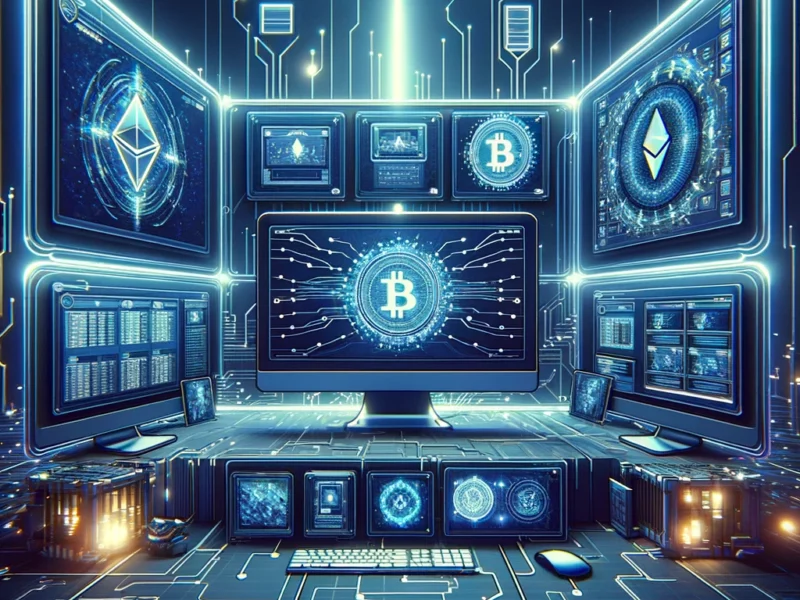Bitcoin mining is the process of verifying transactions on the Bitcoin network and adding them to the public ledger, known as the blockchain. Miners use powerful computers to solve complex mathematical problems, and in return, they are rewarded with newly minted Bitcoins. Bitcoin mining is a lucrative business. As of May 2024, one Bitcoin is worth around $100,000 USD.
However, mining Bitcoin is not as easy as it may seem. It requires a significant investment in hardware and electricity. But, if you are willing to put in the time and effort, it can be rewarding. In this post, we will explain the basics of Bitcoin mining and show you how to start mining bitcoin on your PC.
Jump To
ToggleHow You Can Start Mining on Your Own PC
1. Choose the Right Hardware
The first step is to choose the right hardware. While it is possible to mine Bitcoin using your computer’s CPU or GPU, it is not very efficient and is unlikely to be profitable. Instead, most serious miners use specialized hardware called Application-Specific Integrated Circuits (ASICs). These are designed specifically for mining Bitcoin and are much more powerful and efficient than traditional computer hardware.
When choosing an ASIC, there are a few key factors to consider. First, you should look at the hash rate, which is a measure of how many calculations the ASIC can perform per second. The higher the hash rate, the more likely you are to successfully mine a block and earn a reward. Also, consider the power consumption of the ASIC, as this will have a significant impact on your electricity costs.
2. Set up Your Mining Software
Once you have chosen your hardware, the next step is to set up your mining software. There are a variety of mining software options available, but some of the most popular include CGMiner, BFGMiner, and EasyMiner. These programs allow you to connect your hardware to the Bitcoin network and start mining.
3. Set up a Bitcoin Wallet
Before you start mining, you will also need to set up a Bitcoin wallet to store any Bitcoins you earn. There are many different types of wallets available, including desktop wallets, mobile wallets, and hardware wallets. Choose a wallet that is secure and easy to use, and make sure to keep your private keys safe.
4. Join a Mining Pool
It can be very difficult to successfully mine a Bitcoin block on your own. This is because the Bitcoin network is designed to adjust the difficulty of mining based on the total amount of computing power on the network. As more miners join the network, the difficulty increases, making it harder for individual miners to compete.
To increase your chances of successfully mining a block and earning a reward, many miners choose to join a mining pool. A mining pool is a group of miners who combine their computing power and split the rewards based on the amount of work each miner contributed.
There are different mining pools to choose from, each with its own fees, payment structures, and minimum payout thresholds. Some popular mining pools include Slush Pool, F2Pool, and Antpool. When choosing a mining pool, ensure you do your research and choose a reputable pool with a track record of reliable payouts.
Maximizing Your Mining Profits
Mining Bitcoin can be a lucrative business but many factors can impact your profitability. One of the most significant factors is the cost of electricity. Bitcoin mining requires a lot of energy, and if you live in an area with high electricity costs, it can affect your profits.
To maximize your mining profits, you should optimize your hardware and software for efficiency. This may involve underclocking your ASIC to reduce power consumption or using a mining operating system like HiveOS to manage your mining rigs.
Another important factor to consider is the current price of Bitcoin. The value of Bitcoin can be highly volatile, and if the price drops significantly, it can make mining unprofitable. You should watch the market and adjust your mining strategy accordingly.
The Future of Bitcoin Mining
As Bitcoin continues to gain mainstream adoption, Bitcoin mining keeps evolving. In recent years, we have seen a shift towards larger, more centralized mining operations, as the cost of entry for individual miners has increased.
However, there are also new developments on the horizon that could change the face of Bitcoin mining. One such development is the introduction of more energy-efficient ASICs, which could help to reduce the environmental impact of Bitcoin mining and make it more accessible to individual miners.
Another potential innovation is the development of new consensus algorithms that could replace the current Proof-of-Work (PoW) system used by Bitcoin. Some alternative algorithms, such as Proof-of-Stake (PoS), have the potential to be more energy-efficient and democratize the mining process.
Key Takeaways
- Bitcoin mining is the process of verifying transactions and adding them to the blockchain, rewarding miners with newly minted Bitcoins.
- Mining Bitcoin requires significant investment in specialized hardware (ASICs) and electricity.
- Choosing the right hardware involves considering factors such as hash rate and power consumption.
- Setting up mining software and a secure Bitcoin wallet is essential before starting to mine.
- Joining a reputable mining pool can increase the chances of successfully mining a block and earning rewards.
- Optimizing hardware and software for efficiency and keeping an eye on the Bitcoin market can help maximize mining profits.
- The future of Bitcoin mining may involve more energy-efficient ASICs and new consensus algorithms like Proof-of-Stake (PoS).
Frequently Asked Questions (FAQs)
1. Is it profitable to mine Bitcoin on a personal computer?
– Mining Bitcoin on a personal computer is possible but not very profitable due to the high competition and specialized hardware required. It’s more efficient to use ASICs designed specifically for Bitcoin mining.
2. How much does it cost to start mining Bitcoin?
– The cost of starting to mine Bitcoin varies depending on the price of the necessary hardware (ASICs) and the cost of electricity in your area. It can range from a few hundred dollars to several thousand dollars.
3. Can I mine Bitcoin on my phone?
– Mining Bitcoin on a smartphone is not practical or efficient due to the limited processing power and high energy consumption. It’s better to use dedicated mining hardware.
4. How long does it take to mine 1 Bitcoin?
– The time it takes to mine 1 Bitcoin depends on factors such as the miner’s hash rate, the total hash rate of the Bitcoin network, and the current mining difficulty. It can take anywhere from a few months to several years, depending on these factors.
5. Do I need to pay taxes on Bitcoin mining rewards?
– In most countries, Bitcoin mining rewards are considered taxable income. It’s important to keep accurate records of your mining income and consult with a tax professional to ensure compliance with local tax laws.
6. What happens when all 21 million Bitcoins are mined?
– Once all 21 million Bitcoins are mined, miners will no longer receive block rewards. Instead, they will be incentivized by transaction fees paid by users sending transactions on the Bitcoin network.










